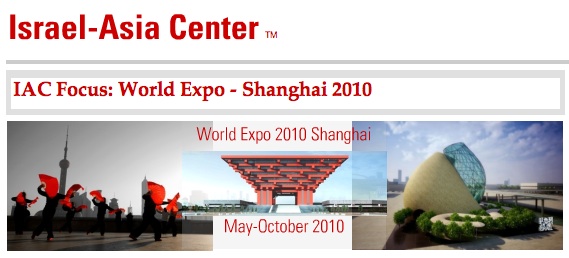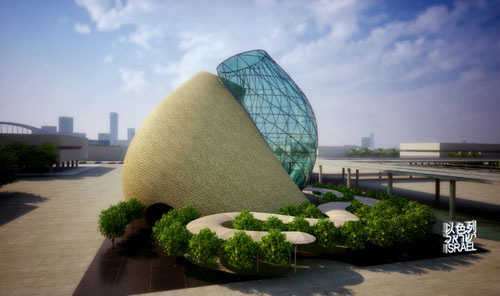 The Israel-Asia Center gives Green Prophet a podcast transcript of their interview with the Chinese Ambassador to Israel. Lots can be gleaned about China’s sustainability vision from the interview.
The Israel-Asia Center gives Green Prophet a podcast transcript of their interview with the Chinese Ambassador to Israel. Lots can be gleaned about China’s sustainability vision from the interview.
The Israel-based Israel-Asia Center recently conducted an interview with the Chinese Ambassador to Israel, Zhao Jun, on what the World Expo means for China, the challenges of urbanization and sustainability facing China’s growing cities, Israel-China relations and Israeli innovation relating to water and clean technology.
Green Prophet presents a transcript of the interview, featuring both David Harris and Rebecca Zeffert from the Israel-Asia Center, and their interview with Zhao Jun. It’s a good read for policy makers, and Middle East entrepreneurs looking to do business (especially green business) with the Far East giant.
David Harris: You’ve been here for three years in Israel. How have you acclimatized? Clearly you have some language skills.
Ambassador Zhao Jun: I learned a little bit Hebrew. But, you know, I like Israel. Before I was offered this posting, I was offered some other postings to some other countries. I did not take it. One of the reasons was that I was not in very good shape or good health after 5 years as the director general of the European department, so I felt a little bit tired. I asked my boss some time to take a rest. In the meantime, I was offered some other things, and eventually, when they offered Israel, immediately, I took it.
Because I like challenging jobs, and in the last 3 years I found my posting in Israel is both interesting and challenging. I’ve enjoyed every minute of my stay in Israel.
First, Israel is a very friendly country with China and the two peoples have a lot of similarities. We have a long history, rich culture. Both languages are the most difficult languages in the world. [Laughs] I tried to learn some Hebrew, but so far it’s unsuccessful because of the heavy workload and because the language itself is difficult.
But still, I’d like to learn something, and my wish, or dream, is that when I give my farewell speech, I can say something in Hebrew.
DH: The Expo taking place in China, in Shanghai, just beginning. Just how significant is this as a window for China?
Amb: Talking about Expo, several days ago there was the grand opening ceremony of the Expo. Everyone from the embassy watched the ceremony because it was live on Chinese TV, and when I watched it, as a Chinese, I was very proud of that, because in 2008, we successfully organized the Olympic Games. Less than two years after that, we’ve successfully opened the grand opening ceremony of the Expo.
Talking about Expo, there are some new records and breakthroughs I should mention. First, this is the first registered Expo ever held in a developing country. Others Expos before the Shanghai Expo were held in developed countries. Another record is the number of participants. This time, we attracted more than 242 countries and organization – including Israel. [See: Israel’s highlighting energy at World Expo]
The main theme of this Expo is innovation and interaction. Innovation is the soul, while cultural interaction is an important mission of the World Exposition. Till 7 May, the 7 days after the Expo site’s opening, over 1 million visitors already visited the Expo. We estimated that during the Expo, there will be between 60-70 million visitors both from China and abroad. So hopefully, we can reach that target.
The Expo is important to China because China and the world are facing a financial crisis. A lot of countries are still in difficulties – especially in the European Union, and we do hope that this Expo will give great impetus to the renewal and recovery of the international economy. China is also facing challenges and difficulties in some areas. So we do hope that the Expo will give impetus to the recovery of China’s economy and to the economy of Asia and the world in general.
Rebecca Zeffert: The slogan of the Shanghai Expo is ‘Better City, Better life’. How does this slogan translate into reality for Shanghai’s recent and future development?
Amb: This exposition is a great event to explore the full potential of urban life in the 21st century. The prospect of future urban life, which is a subject of global interest, concerns all nations, developed or less developed, and their people.
During the period of Shanghai Expo, participants will display urban civilization to the full extent, exchange new approaches to human habitat, lifestyle and working conditions in the new century, and will get the chance to learn how to create an eco-friendly society and maintain the sustainable development of human beings.
In the past centuries, Shanghai gradually developed into an important port city on the eastern coast of China,
With this urbanization of Shanghai, Shanghai is confronted with many challenges in city planning and reconstruction, such as the balance of city center, residential community and industrial zones. To fulfill this Expo’s slogan ‘Better City, Better Life’, Shanghai Municipality’s selection of the Expo site along the Huangpu River is a successful attempt to set up the CBD area by moving the industrial factories out of the city center.
I am sure you must notice that some of the pavilions in the Expo site are constructed upon the sites of some old factory buildings, therefore transforming potential pollution-makers to some high-tech, eco-friendly modern buildings. Shanghai Expo embodies its spirit to realize the sustainable development of human beings.
RZ: The focus on the Expo is sustainability. What sustainable solutions do you foresee for the challenges facing China’s growing cities?
Amb: China is a developing country, with a large population and a vast territory.
While the eastern coast of China’s cities are fast developing, the northwest and midwest part of China are still underdeveloped. So, we face a lot of problems. While the urbanization ratio skyrocketed from 18% in 1978 to 48% in 2010, the Chinese Government and people have been facing some significant challenges in the urbanization process. For example, environmental protection.
Although the government attaches huge importance of this issue and took a lot of measures to curb pollution, due to vehicle emissions (nowadays everyday in Beijing alone, we have 20,000 new vehicles), so it’s a big challenge – industrial waste and housing reconstruction, and also because of the global climate change, we face a very challenging task in controlling pollutions in cities.
Another example is harmonization between local citizens and temporary immigrants. Migrant workers from the rural areas now constitute a very important factor in the growth of the Chinese economy. They are needed in urban development, because especially in the cities, all this work is done by the peasants who came to the cities to fine a better life. So, although the government has adopted many measures to solve these people’s difficulties in daily life, such as healthcare, schooling of their children in the cities, still we need to do more.
However, the Shanghai Exposition offers a wonderful opportunity for a dialogue of different cultures, and for harmonious lifestyle. Before the conclusion of the Exposition, a ‘Shanghai Declaration’ will be issued. This declaration, hopefully a milestone in the history of the World Exposition, will epitomize the insights to be offered by the participants and embody people’s ideas for future cooperation and development and extensive common aspirations, thereby leaving a rich spiritual legacy of urban development to people throughout the world.
As the Shanghai Expo motto goes, “Keep in mind the next 60 years’ of development while preparing for the six months’ Exposition”.
World Exposition is an event to spread the concept of innovation and interaction. In Shanghai, the participants and visitors are exposed to many advanced scientific and technological methods to have a sustainable city life and some pavilions, including China Pavilion, which will permanently stay in Expo site as parts of the Shanghai Expo Museum. When the Shanghai Expo concludes, we will keep on making utmost efforts to maintain the positive outcomes of this Expo.
DH: There’s something about China that has changed Israel’s mind about the Expo and it’s jumped in.
Amb: This is the first time for Israel to participate with its own pavilion in an Expo. Maybe on other occasions you participated but without your own pavilion.
It’s a must for Israel to teach other countries how to adapt these innovations, new technologies to their on reality and their own circumstances and to help the other developing countries to develop.
What matters most is that Israel is the world leader in innovation and new technologies and economic strength is very strong. So far as I know, the average GDP per capita of Israel is almost $30,000 US. Compared to China, it’s a big, big success. China’s GDP per capita now is less than $4,000 US.
So, we are very glad that Israel participates actively in this Expo… and I’m are very glad that Israel made the right decision to participate, and your pavilion is a major attraction in the Expo, and the pavilion was covered exclusively, comprehensively by Chinese media – not only by the media in Shanghai – all over China.
There was an enthusiastic debate about your pavilion. Some people said it’s the shape of a seashell. Others said it’s not the shape of a seashell, it’s something else. There are interesting debates. Personally, I talked to the architect. He’s a friend of mine. I invited him and his wife for lunch and he talked about the design. He told me the design symbolizes Israeli innovation and technology and represents the dialogue between humanity and nature, the earth and the sky, as well as the past and future. So, he told me personally.

On the 6th of this month, you had the Israeli Pavilion day. There was a long, long queue outside the Israeli Pavilion. People had to wait a long time to enter your pavilion.
Why? As I said, it’s a major attraction and because the design is unique. Another reason is that Israel is well-known in China. It is well known in the world for its innovation and hi-tech and other new technologies, so people are interested.
Another major attraction is the manuscripts of Einstein. You know, I have made my contribution to this because I made a suggestion to [Finance] Minister [Yuval] Steinitz. Before he went to China, he had some meetings with me. During one of those meetings, I told him, please Minister, if Israel can bring some manuscripts of Einstein to this pavilion, it will be a big attraction for the visitors – both Chinese and visitors from abroad. I’m very glad that he listened to my advice and they brought the manuscripts of Einstein to the pavilion. I wish Israel every success in this Expo.
DH. This year marks 18 years of formal diplomatic relations between Israel and China. How far has the relationship come since 1992?
Amb: Despite the brevity of our diplomatic ties, the bilateral relations maintained a very good momentum. The past 18 years have witnessed deepened mutual trust, enhanced economic and trade cooperation, expanded cultural and technological exchanges and strengthened coordination on regional and international affairs. In these years, Sino-Israeli trade volume registered a growth of 120 times.
When we established diplomatic relations in 1992, trade volume between our two countries was only $50 US million. Trade volume of last year reached more than $5 billion, and the trade volume of 2008 was even bigger – $6.4 US billion. Because of the world financial crisis, we suffered a little bit. But now, we have been picking up.
So, the numbers, statistics of the first quarter of this year is very encouraging. China now is Israel’s largest trading partner in Asia and the third largest in the world. More than 200 Israeli enterprises have invested and set up businesses in more than 20 provinces and cities all over China in the fields of agriculture, telecommunications, chemicals, medical care and insurance, environmental protection, even jewelry processing. I am sure the development of all this cooperation will fasten the bilateral economic ties and bring much more tangible benefits to the two peoples.
DH: What are the main challenges to be overcome?
Amb: This year is a special year in our bilateral ties because since the first quarter, high level exchanges between our two countries have been going on actively. In February, Vice Prime Minister Moshe Ya’alon visited China, and in March our Vice Premier [of China Hui Liangyu] visited Israel.
That was the highest level and most important visit from China since 2000 when the then-Chinese President visited Israel. Besides there have been a parade of Ministers or local government officials visiting the other country. Now we have been preparing for the Prime Minister’s visit to China.
So this on the whole will be a historical year. We talked about three ministers who are in China this month, and starting from this month, every month, there will be at least one or two Israeli ministers visiting China. And from the Chinese side, we’ll have sometimes three or four ministers, deputy ministers or even governors from the provinces.
DH: Who does that push come from?
Amb: This is from both sides. Because we believe – both China and Israel – we are highly complementary to each other – in economic conditions. And China’s a developing country. Israel’s a developed country. Israel is a world leader in lot of domains. China has a vast market. We can combine these two advantages to further develop our cooperation and economy for the benefits and interests of two nations and two peoples.
While China can learn a lot from Israel – innovations, new technologies, agriculture – Israel’s weather condition is similar to some of China’s provinces. For example, where I was born in the north west of China, the weather conditions are more or less the same as in Israel. But the living standard and development in those areas are low.
So, I have made efforts to encourage local government officials from this province to visit Israel and try to learn from Israel – starting from water irrigation, drip irrigation system. Because by doing so, they can save a lot of water, because there’s a big shortage of water in that area.
That was what we need – to learn from Israel and to improve people’s living standards. In some areas, people don’t even have decent water to drink. So, by doing so, they can save water and improve people’s livelihood, living standards. So you talked about challenges and the economic situation, and the financial crisis. China is doing well, Israel is doing well, but we need to join hands together to combine our advantages: Israel’s innovation technology with China’s huge market. And to achieve more tangible benefits for both nations and both peoples.
In our political relations, I believe that we should work more to strengthen, to enhance mutual trust. There is mutual trust between the two countries. We need to work harder to strengthen it, to strengthen the mechanism of dialogue between the two ministries of foreign affairs and between other ministries. And we should keep these high level of exchanges.
For example, all Israeli presidents since 1992 have visited China officially. Our President visited China only once in 2000. From my part, it’s my wish that someday, we can bring our President to visit Israel. Now we talked about visits by other ministers from your side. I can assure you, we have been working on a visit by your Prime Minister hopefully this year. We have been coordinating two sides on the timing of the visit.
He is most welcome to visit China. There were distortions by some local news media – even by some politicians. They thought that Mr. Netanyahu is not welcome to China. It’s not true. We have been coordinating with the Ministry of Foreign Affairs on the timing of the visit. We need to find a time which is convenient for both sides. So, I think with all these high level exchanges, we can push bilateral ties to a new height – to give impetus to our cooperation in other fields: economic, education, cultural, science, technology.
DH: Is there something Israel needs to achieve on the diplomatic peace front that will help speed up the mechanisms to allow for greater cooperation between the two countries?
Amb: This is a good question. We don’t mix up the peace initiative in the Middle East with our bilateral relations. These are two different issues. Myself as ambassador, I know Israel is a friendly country with China. China is an important country in the Israelis’ eyes. In Chinese eyes, in my eyes, Israel is an important country, is a key country in the Middle East. We attach great importance to each other.
So, we know that to further enhance and develop our relationship is conducive to world peace and stability and peace in the Middle East. And it’s in the interests of our two nations and two peoples. That’s why we have that common goal and common aspiration to further develop and enhance our bilateral relations.
RZ: This year marks the 90th anniversary of the Ohel Rachel synagogue in Shanghai. How do you feel that Shanghai’s Jewish past can serve to build closer ties between China and the Jewish world in the future?
Amb: You have a very big community in Shanghai. I’ve been there also. I was invited by the local authorities.
Friendly exchanges between the Chinese people and the Jewish people can be dated back 1,000 years ago, to the Tang Dynasty, when [Jewish] business people came to China on the Silk Road to d business in Henan province, in Kaifeng. That was the first group of [Jewish] people who settled down in China. And then during the Second World War, Shanghai was a shelter for Jewish refugees. At that time, Shanghai was under occupation by the Japanese aggressors. Despite all these sufferings and difficulties, the Chinese people, opened their doors – especially the Shanghainese – to the Jewish refugees and provided them their sincere support and protection. So, we could say the friendship between Jewish people and the Chinese people withstood the test of history and is characterized by sincerity and mutual assistance and sympathy.
In the Israeli Pavilion of the Shanghai Expo, there is a special exhibition on the history of the Jewish people in Shanghai during World War Two. Many visitors are deeply touched by the genuine friendship between Chinese and Jewish people. This year, my embassy is working on a tour of exhibition of Sino-Israeli friendship. The series of exhibitions will be co-hosted by the embassy and around 20 twin sister cities with China – including Haifa. We were in Haifa also, we were in Ashdod. The opening exhibition was in Ashdod during the Chinese Spring Festival in February. The exhibition now is in Haifa. Each of them aroused much pubic interest. So I believe that with our mutual efforts to build close ties, the Chinese and Jewish people will work jointly to write new chapters in our history.
Shanghai will play a more important role in furthering our relations. It has been the symbol of our sincere friendship and mutual support because of historical reasons. It is also a twin sister city with Haifa. And the Israeli Consulate General in Shanghai is very active. And by the way, I’d like to say something about your ambassador. You have a very excellent, unique ambassador and active ambassador in Beijing. So, I’m confident Shanghai will continue to be a bridge and a focal point of cooperation and friendship between Israel and China and between the Jewish people and the Chinese people.
Toda Raba (Thank you)
I believe you [the Israel-Asia Center] have been playing a bridge between China and Israel – between the Chinese embassy and the Israeli audience. For this, I thank you very much. Toda Raba.
More on the China World Expo:
Saudi Splurges for the World Expo
Israel Highlights Energy at the World Expo in Shanghai




Observers maintain the item displays a new coherent approach, one thing
thus low in your culture, that it’s not necessarily realised
by simply all. * Let you know there are things you can do to improve y0ur ranking.
The only tab of your concern is Public Templates, and no actions are necessary as it is already on the screen.
my site Google
Great post! The Penn Museum in Philadelphia is currently presenting an exhibit on the history and cultures of the Silk Road. Check it out – http://www.penn.museum/silkroad/
Should have asked him about Tibet